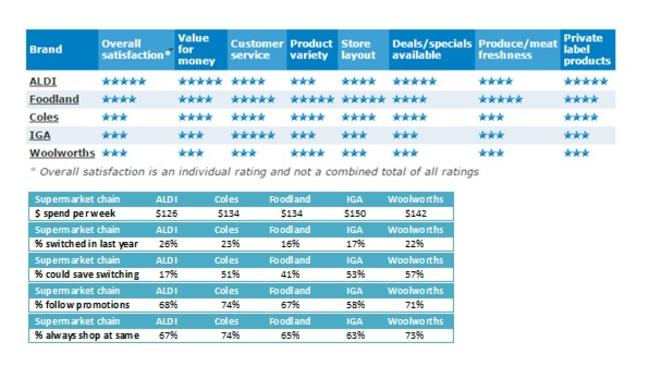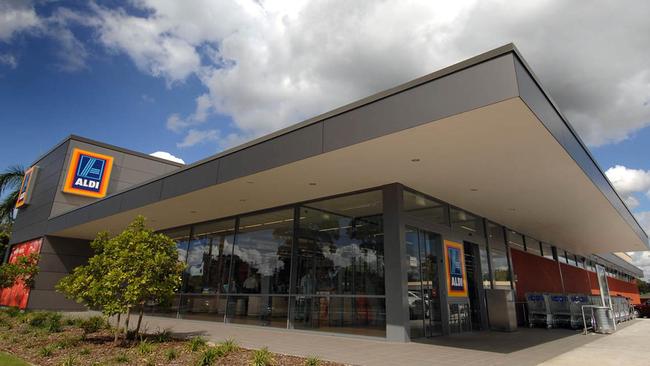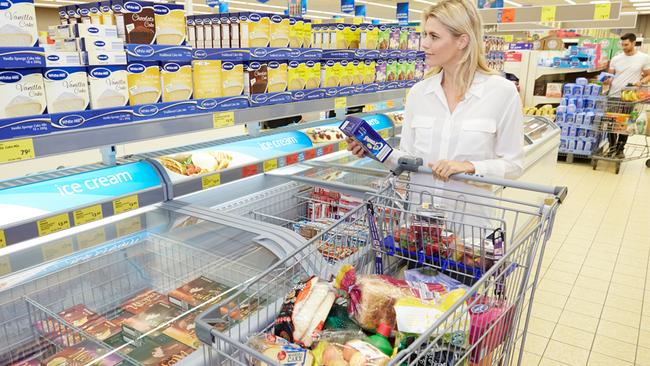The supermarket switch is on as Aldi takes top award in customer satisfaction
AUSSIES love to hate on supermarkets — it’s like a national sport. But with new players in the field, the game is changing. This is how we really feel.
IT’S official — Aldi has the happiest customers.
Price-conscious Aussie shoppers have named Aldi the country’s best supermarket for the second year in a row in consumer research company Canstar Blue’s supermarket satisfaction awards.
The German discount chain took five stars in four out of eight categories, including value for money, deals/specials available and private label products, and was the only supermarket to achieve top marks for overall satisfaction.
The customer satisfaction ratings were achieved by asking survey respondents to score the supermarket chain they use for the bulk of their shopping across a range of criteria.
After taking the top honour last year, Aldi went one up in 2015, increasing from four stars to five in overall satisfaction and three stars to four in customer service.
Woolworths ranked lowest out of the five supermarkets, taking three stars in all categories except product variety, where it scored four stars. IGA scored three stars in all categories except customer service, where it increased from four stars to five.
While Woolies remained unchanged from last year across all categories, Coles has stolen a march on its main competitor, improving its scores in value for money, customer service and deals/specials, each increasing from three stars to four.
South Australian chain Foodland also impressed across most categories, taking five stars in customer service, product variety, store layout and produce/meat freshness, but lost one star in overall satisfaction from last year.

SUPERMARKET SWITCHING
The survey of 3000 shoppers found that nearly one in four (23 per cent) have switched supermarkets in the past year, and Aldi customers were the most likely to vote with their feet, with 26 per cent of its customers having switched in that time.
Those aged in their 30s were most likely to switch (30 per cent), and along with those aged 18-29, were most convinced they could save money by shopping elsewhere (56 per cent). Those aged in their 30s and 40s were most likely to closely follow special offers (75 per cent).
“Some people simply can’t overlook the convenience of shopping at the closest supermarket to their home or workplace,” said Canstar Blue’s Megan Doyle. “Most consumers like to be familiar with the layout of their local store and the products it sells, so it takes a lot to make someone switch.
“But increasing competition from physical and online retailers has opened many people’s eyes to potential savings. If your friends or family keep talking about the money they save at another supermarket, eventually you’re going to try it for yourself.”
Mrs Doyle said consumers want good product variety and good store layout, but “ultimately they want value for money — and they’re convinced Aldi currently offers that”.
Fifty per cent of respondents believe they could save on grocery costs by switching supermarkets, 71 per cent pay close attention to supermarket promotions, and 35 per cent said the cost of essentials like milk and bread determines where they shop.
Unsurprisingly, the top reason for switching supermarkets was to save money (50 per cent), followed by better-quality products (15 per cent), convenience (12 per cent) and attractive rewards programs (11 per cent).
Eight per cent said they were not sure why they switched, and just two per cent put it down to advertising.
But while three-quarters of those who switched to Aldi did so to save money, other factors were more common for those who switched to other supermarkets.
Shoppers who switched to Coles, Woolworths or IGA were most likely to have done so for loyalty programs or convenience, while those who changed to IGA or Foodland were most likely to have done so for better quality products, according to Canstar.
Those who switched to Foodland were also the most likely to have done so because they were impressed by advertising.

LOYALTY AND SATISFACTION
The biggest reason for sticking with a supermarket was convenience (37 per cent), followed by familiarity with store layout (17 per cent), enjoyment of rewards programs (15 per cent), perception of being cheapest (12 per cent) and favouring products for sale (11 per cent).
Six per cent said they stuck with their supermarket out of habit.
The biggest driver of customer satisfaction was value for money (23 per cent), followed by store layout and presentation (15 per cent), range of products (15 per cent), customer service and availability of staff (11 per cent), special offers (9 per cent) and quality of private label products (6 per cent).
Interestingly, despite one in four adults having changed where they do the bulk of their grocery shopping, only 72 per cent said they always shop at the same chain.
Those who shop at Coles or Woolworths were the most likely to remain loyal, with 74 per cent of Coles and 73 per cent of Woolies customers saying they always shop at the same place, compared with 67 per cent of Aldi customers, 65 per cent of Foodland customers and 63 per cent of IGA customers.
“Even if they don’t completely switch, consumers are closely following the supermarket price wars and don’t mind taking their money elsewhere on occasions,” said Mrs Doyle. “It appears we are loyal to our budgets, not our supermarkets.”
The average weekly supermarket spend was $138, with those aged in their 40s spending the most. Aldi shoppers had the lowest average weekly spend with $126, while IGA shoppers had the highest at $150. Woolworths shoppers spent an average of $142, while Coles and Foodland shoppers spent $134.
Overall, 44 per cent said they tend to buy private label products over big name brands, with 59 per cent believing cheaper products are just as good — Aldi shoppers were most likely to agree on both counts.
Three quarters of respondents said it was important to buy locally produced food, with Foodland shoppers most likely to agree (84 per cent). Overall, however, 46 per cent said price was more important, with Aldi customers the most likely to put price first (52 per cent).

UNSTOPPABLE RISE
Last week, a survey by Morgan Stanley found Aldi was stealing customers as they increasingly prioritise value over fresh food. Morgan Stanley is now revising its market share forecasts upwards for Aldi and Costco, having previously projected Aldi to increase from 5.5 per cent to 11.1 per cent in five years’ time, and Costco from 0.7 per cent to 1.8 per cent.
Woolworths holds 38.5 per cent and Coles 31.8 per cent.
Aldi is planning to open up to 130 stores in South Australia and WA, and a further 20 in the eastern states. Business Spectator reports the discounter is capturing more of the middle class market with its own-brand products.
Consumer group Choice’s recent Supermarket Price Survey found customers could save up to 50 per cent off their weekly grocery bill by shopping at Aldi.
In a statement, an Aldi spokeswoman said: “Aldi Australia is delighted to receive Canstar’s Most Satisfied Customers Award in the Supermarket category for the fourth time in the last five years.
“We’re proud to have achieved top marks for overall satisfaction and value for money, as well as recognition for our Special Buys and private label products. The award is testament to the continued value and great shopping experience Aldi offers to the Australian community every day.
“Everything we do at Aldi is designed to enable Australian shoppers to live richer lives for less. Our unique business model allows us to provide unbeatable prices on our range of high quality products.
“We eliminate all costly extras and overheads by selecting only the best products in each category, displaying products in reusable crates and not giving out plastic bags, which encourages customers to recycle. We’re focused on selling our select range of exclusive brands rather than spending money on customer loyalty programs or expensive point of sale displays. All of which means we can deliver permanently lower prices to consumers.”




